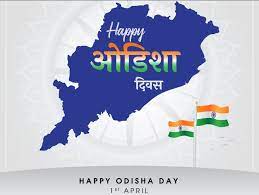
Odisha Day or Utkal Divas 2023: Odisha Day, also known as Utkal Divas, is a significant day for the people of Odisha, India, as it commemorates the state’s formation on April 1, 1936. Every year on this day, the state celebrates with cultural programs, parades, and flag hoisting ceremonies. Community leaders and politicians deliver speeches highlighting the achievements and history of the state. This event provides the opportunity for the people of Odisha to come together and celebrate their cultural heritage and progress made by the state. Odisha, also known as the Land of Lord Jagannath, attracts tourists with its scenic seas and ancient temples such as the Jagannath Puri Temple and the Sun Temple of Konark. This year, on April 1, Odisha will celebrate its 88th foundation day.
March 2023 Current Affairs Quiz
History of Odisha
- Odisha, also known as Orissa, is an eastern Indian state with a long history dating back to antiquity. The earliest evidence of human habitation in the region dates back to the Stone Age, with archaeological sites such as Golbai Sasan providing evidence of early settlements.
- The region was ruled by the powerful emperor Ashoka in the third century BCE, who is known for his conversion to Buddhism and role in spreading the religion across the Indian subcontinent. Following the decline of the Mauryan Empire, the region came under the control of various dynasties, including the Satavahanas, the Ikshvakus, and the Kharavela of the Mahameghavahana dynasty.
- During the medieval period, Odisha was ruled by various Hindu dynasties, including the Eastern Ganga dynasty, which oversaw a period of cultural and artistic development. The state was also an important hub for the spread of the Bhakti movement, with saints like Jayadeva and Ramanuja helping to shape the tradition.
- In the 16th century, Odisha came under the control of the Mughal Empire, and later the British East India Company. The state was instrumental in the Indian independence movement, with leaders such as Utkal Gourav Madhusudan Das, Gopabandhu Das, and Biju Patnaik contributing to the cause.
- After India gained independence in 1947, Odisha became a state on April 1, 1936, and has since emerged as a center for industry, agriculture, and tourism. The state has a rich cultural heritage, with a vibrant arts and crafts tradition, ancient temples, and festivals such as the Rath Yatra in Puri attracting visitors from across the country and around the world.
Here are some important dates in the history of Odisha:
- 261 BCE: Ashoka the Great, the Mauryan Emperor, conquered the region and established a government in Tosali.
- 3rd century CE: The Kalinga War between the Mauryan Empire and the Kalinga kingdom, which is modern-day Odisha.
- 6th century CE: The Eastern Ganga dynasty established its rule over Odisha, which lasted until the 15th century.
- 13th century CE: The construction of the Sun Temple in Konark.
- 16th century CE: Odisha came under the rule of the Mughal Empire.
- 1803 CE: The British East India Company took control of Odisha after defeating the Marathas.
- 1827 CE: Establishment of the Orissa Medical School, which is now known as the SCB Medical College and Hospital.
- 1876 CE: Formation of the Utkal Sabha, a political organization that fought for the rights of Odia people.
- 1936 CE: Odisha became a separate state on April 1, with the passing of the Government of India Act, 1935.
- 1950 CE: The Jagannath Temple Act was passed, which gave control of the temple to the state government.
- 2019 CE: The Indian government declared Odisha as the first “open defecation free” state in the country.





